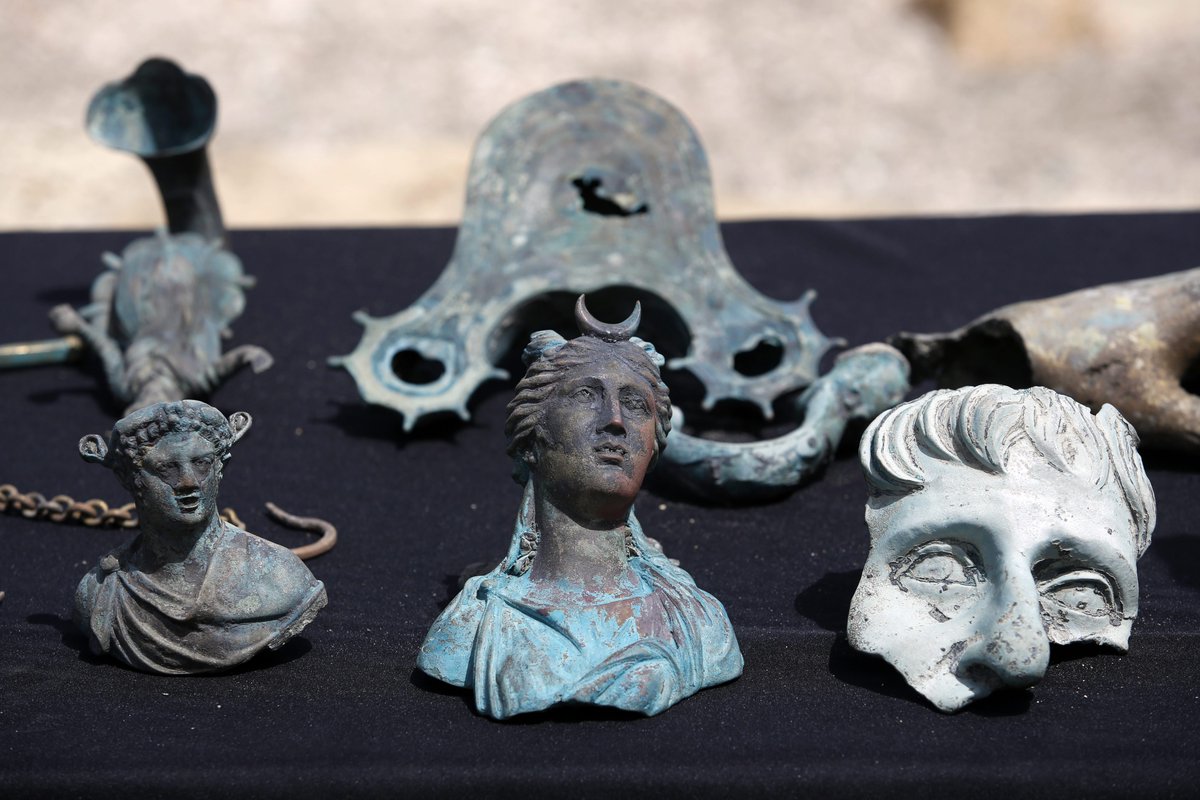The ancient world had something in common
with the modern one: a penchant for recycling. While that’s good for the
environment, that means plenty of historical treasures were melted down and
turned into something else.
But 1,600 years ago, a shipload of Ancient
Roman cargo was in the Mediterranean seaport of Caeserea in Israel, stuffed to
the gills with metal slated for recycling, the Times of Israel reported.

That metal would never be recycled. Instead,
the merchant vessel sailed into a storm at the entrance to the harbor. It
drifted in the water until it smashed into a seawall and rocks. Israel
Antiquities Authority director Jacob Sharvit and deputy director Dror Planer
said both cargo and ship wrecked together, and therefore the treasures inside
were “saved from the recycling process.”
The ancient crew tried their best to save the
sinking ship and its recyclable cargo by dropping anchors into the sea, but to no
avail, Sharvit and Planer said.
Fast forward to last month, when two
recreational divers were swimming in the harbor. Ran Feinstein and Ofer Ra’anan
were diving at the site of the ancient harbor in Caesarea National Park when
they noticed something interesting on the sea bed: the remains of a ship and
its contents, “left uncovered on the sea bottom,” according to Reuters.
Ran and Ofer contacted the IAA right away,
and the agency sent their own divers to examine the site. Archaeologists employed
some specialized equipment and began an underwater salvage survey to take a
closer look.
Eventually, they uncovered something
remarkable: the largest stash of marine artifacts found in Israel in 30 years,
including iron anchors, coins, and bronze statues. The directors of the IAA
spoke in grand terms about the find.
Among the treasures in the Ancient Roman
cargo: a bronze lamp featuring the sun god Sol, a figurine of the moon goddess
Luna, a lamp shaped like the head of an African slave, the remnants of three
life-size bronze statues, and various objects shaped like animals, Discovery
reported.
According to the IAA, they found “objects
fashioned in the shape of animals such as a whale [and] a bronze faucet in the
form of a wild boar with a swan on its head,” and all of them “in an amazing
state of preservation.”


Metal statues like those found among this Ancient Roman cargo are rare finds in the world of archaeology because such items were “always melted down and recycled in antiquity.”
Among the less artistic finds were fragments
of jars that were used for drinking water by the crew, remains of wooden
anchors, and “items that were used in the construction and running of the
sailing vessel.”
They also uncovered two metallic lumps that
turned out to be hunks of thousands of coins fused together and shaped like the
pottery vessel they were transported in 1,600 years ago. The lumps weighed
about 40 pounds and featured the images of Constantine the Great and of
Licinius.
Emperor Constantine ruled the eastern half of
the Roman empire and came to be known as Constantine the Great. Licinius was
his rival and ruled the eastern part of the Empire. These two men co-authored
an edict that officially tolerated Christianity within the Ancient Roman
empire. Licinius eventually submitted to Constantine after the Battle of
Chrysopolis in 324 AD.
According to the IAA, the Ancient Roman cargo
reflect a period of “economic and commercial stability in the wake of the
stability of the Roman Empire,” during in which “Christianity was on its way to
becoming the official religion,” Agence France Press added.
Source: inquisitr.
17 May 2016
No comments:
Post a Comment